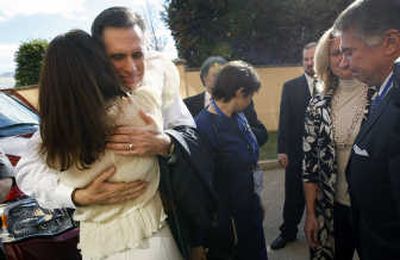McCain shifts his focus to Democratic rivals

WASHINGTON – Sen. John McCain effectively sealed the Republican presidential nomination Thursday when former Gov. Mitt Romney abruptly ended his campaign. The Arizona senator immediately turned his attention to repairing relations with disgruntled GOP conservatives and opening the general election campaign with a sharp critique of his Democratic rivals.
McCain signaled a fall campaign against either Sen. Hillary Rodham Clinton or Sen. Barack Obama based on conservative principles and built around his national security credentials and reputation as an opponent of wasteful government spending.
He presented his support for President Bush’s troop surge strategy in Iraq as a badge of honor and charged that both of his opponents would recklessly adopt a timetable for withdrawing U.S. forces from the conflict without regard for the “profound human calamity” and heightened danger to U.S. security that he said would ensue.
“Often elections in this country are fought within the margins of small differences,” he said. “This one will not be. We are arguing about hugely consequential things. Whomever the Democrats nominate, they would govern this country in a way that will, in my opinion, take this country backward.”
McCain was especially harsh in his criticism of Clinton and Obama on national security issues, asserting that neither fully recognizes the threat of an Iran with nuclear ambitions and that both will concede to critics of America that this country’s actions in its defense have helped stir Islamic radicalism.
Romney’s departure from the Republican race, triggered by a disappointing showing on Super Tuesday, wrote a storybook conclusion to a nomination battle that saw McCain go from putative front-runner to struggling long shot to party standard bearer over the course of the past year.
But the reception McCain received at Thursday’s annual Conservative Political Action Conference, where he was booed loudly when introduced, pointed to the fractured coalition that he must now reunite before what is expected to be a challenging fall campaign against either Clinton or Obama.
“I am acutely aware that I cannot succeed in that endeavor (of uniting the party), nor can our party prevail over the challenge we will face from either Senator Clinton or Senator Obama, without the support of dedicated conservatives, whose convictions, creativity and energy have been indispensable to the success our party has had over the last quarter century,” he said.
Romney announced his decision at the end of his appearance at CPAC and hours before McCain appeared. His speech sounded like a conservative call to arms by a candidate still engaged in a battle for the nomination, but he explained his decision not to keep going as one influenced by the fact that the country is at war.
“I disagree with Senator McCain on a number of issues, as you know,” he said. “But I agree with him on doing whatever it takes to be successful in Iraq, on finding and executing Osama bin Laden and on eliminating al-Qaida and terror. If I fight on in my campaign, all the way to the convention, I would forestall the launch of a national campaign and make it more likely that Senator Clinton or Obama would win. And in this time of war, I simply cannot let my campaign be a part of aiding a surrender to terror.”
Romney praised McCain in the speech but did not offer an endorsement. According to one adviser, he has no plans to offer a formal endorsement to preserve a role for his supporters in shaping the party platform at the national convention this summer.
Two candidates remain to oppose McCain – former Arkansas Gov. Mike Huckabee and Rep. Ron Paul of Texas – but neither has a plausible chance to win the nomination.